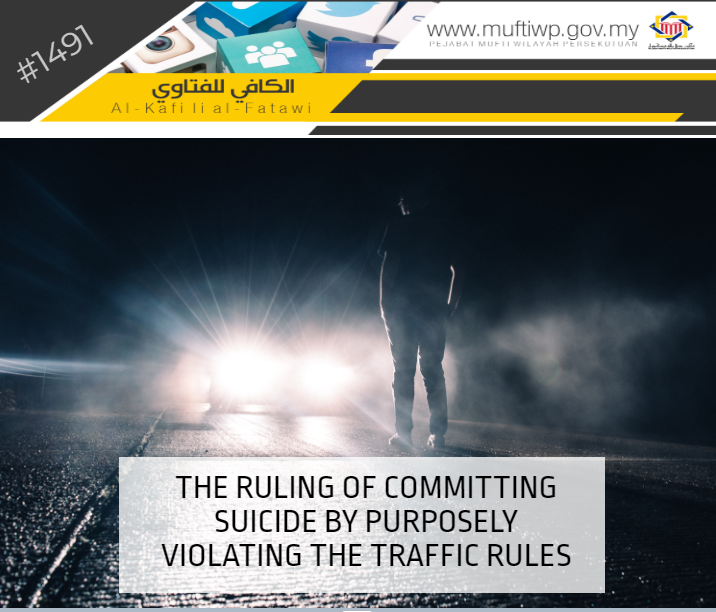Question:
Assalamualaikum wbt. Is it considered as suicide if a person purposely violates the traffic rules and it led to death in an accident?
Answer:
Waalaikumussalam wrt, wbt.
Alhamdulillah, praise and thanks to Allah for the countless blessings He has blessed us all with. Blessings and salutations to the Prophet Muhammad PBUH, his wives, his family, companions and all those that follow his teachings to the day of judgement.
Muqaddimah
Basically, the traffic rules implemented is in accordance with maqasid syar’iyyah, specifically in protecting life (hifz al-nafs) and property (hifz al-mal). The enforcement of traffic law is to ensure the safety of road users. Thus, the ruling of complying the traffic rules is wajib. This is related to the obligation to obey a ruler or government by complying with the laws and rules set by the authorities is wajib as long as it does not contradict the Quran and sunnah.
Allah SWT states:
يَا أَيُّهَا الَّذِينَ آمَنُوا أَطِيعُوا اللَّهَ وَأَطِيعُوا الرَّسُولَ وَأُولِي الْأَمْرِ مِنكُمْ
“O you who have believed, obey Allah and obey the Messenger and those in authority among you.”
Surah al-Maidah (59)
Thus, a person is considered as sinful if he drives recklessly that it would harm himself or others in public. We have explained in detail about this matter in our previous article Bayan Linnas Series 180: Fiqh of Road Rules in Conjunction with Eid http://bit.ly/38WzzEi
The Crime of Suicide is Haram
Allah SWT states:
وَلَا تَقْتُلُوا النَّفْسَ الَّتِي حَرَّمَ اللَّهُ إِلَّا بِالْحَقِّ
“And do not kill the soul which Allah has forbidden, except by right.”
Surah al-Israa’ (33)
It is clearly stated in surah al-Israa’ that generally, killing without a reason permitted by syara’ is haram and this includes suicide. Furthermore, we are warned against committing suicide with horrible punishment of it in the hereafter.
In a hadith narrated by Abu Hurairah RA, the Prophet PBUH said:
مَنْ قَتَلَ نَفْسَهُ بِحَدِيدَةٍ فَحَدِيدَتُهُ فِي يَدِهِ يَتَوَجَّأُ بِهَا فِي بَطْنِهِ فِي نَارِ جَهَنَّمَ خَالِدًا مُخَلَّدًا فِيهَا أَبَدًا، وَمَنْ شَرِبَ سُمًّا فَقَتَلَ نَفْسَهُ فَهُوَ يَتَحَسَّاهُ فِي نَارِ جَهَنَّمَ خَالِدًا مُخَلَّدًا فِيهَا أَبَدًا، وَمَنْ تَرَدَّى مِنْ جَبَلٍ فَقَتَلَ نَفْسَهُ فَهُوَ يَتَرَدَّى فِي نَارِ جَهَنَّمَ خَالِدًا مُخَلَّدًا فِيهَا أَبَدًا
“He who killed himself with steel (weapon) would be the eternal denizen of the Fire of Hell and he would have that weapon in his hand and would be thrusting that in his stomach for ever and ever, he who drank poison and killed himself would sip that in the Fire of Hell where he is doomed for ever and ever; and he who killed himself by falling from (the top of) a mountain would constantly fall in the Fire of Hell and would live there for ever and ever.”
Sahih Muslim (109)
Imam al-Nawawi said that a person who committed suicide with something, then he will be punished the same way he committed suicide in hellfire and he will never enter paradise unless he is a Muslim. (Refer al-Minhaj 2/118)
There are three divisions of suicide in terms of the intentions of the person who commits suicide:
- Purposely and intentionally committing suicide (القتل عمدا): committing something that will kill himself with the intention of committing suicide such as drinking poison.
- Committing suicide that appears as though it is intentional (القتل شبه العمد): committing something without the intention of killing himself with something that will not usually cause death, such as hitting himself with a small branch.
- Accidental suicide (القتل خطأ): an unintentional act that could lead to death for himself or mistake killing, such as falling into his own trap. (Refer al-Mausu’ah al-Fiqhiyyah al-Kuwaitiyyah 6/282 and32/327-328)
The majority of the jurists (Hanafiyah, Syafie’yah, Hanabilah) hold the opinion that it is not considered as murder if the murderer did not have the intention to kill or use a weapon that could kill. The reason is intention is something that is not visible, thus, it is determined through qarinah which is apparent, for example, looking at the instrument or method used as miqyas to his intention. It is known that a killer will use a suitable instrument to kill for example a knife. Thus, if the instrument or method used is not what is usual to kill such as hitting or using a small rock, but it leads to death, then the murder is considered as a murder that is close to intentional. (Refer al-Fiqh al-Islami wa Adillatuh 7/5658)
Conclusion
To conclude, to differentiate whether it is intentional, close to intentional or unintentional killing is according to the intention of the person when committing the act, then the type of instrument and method used that lead to death is considered.
Coming back to the question, we surmise the following matters:
- Violating the traffic rules for whatever reason is sinful for it opens a possibility of harm that may happen.
- If a person purposely puts himself in the middle of the road or drives recklessly with the intention of committing suicide or harming himself to kill himself, then it is considered as suicide.
- And if a person violates the traffic rules such as exceeding the speed limit because he feels that it is still safe and under control, then it is not considered as suicide if he gets involves in an accident and died. This is in line with the Islamic legal maxim:
الأمور بمقاصدها
“An action is considered in accordance with the intention.”
Thus, as a Muslim, we should always be careful and never put ourselves or the person around us in harm’s way. Allah SWT states:
وَلَا تُلْقُوا بِأَيْدِيكُمْ إِلَى التَّهْلُكَةِ وَأَحْسِنُوا
“…and do not throw [yourselves] with your [own] hands into destruction [by refraining].”
Surah al-Baqarah (195)
May Allah SWT always grant us goodness in our daily lives. Wallahua’lam.


